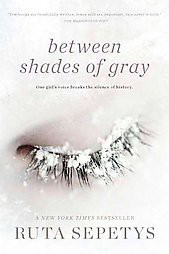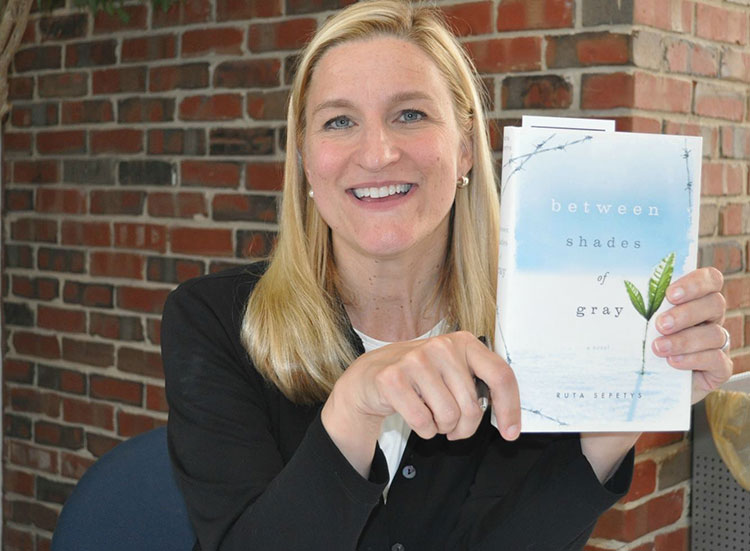Internationally acclaimed author Ruta Sepetys will spend three days in North Central Washington visiting high schools and giving a community talk in Wenatchee next week.
During her residency, she will visit high schools in East Wenatchee and Cashmere on Wednesday, Pateros and the Methow Valley on Thursday, and Moses Lake
and Warden on Friday.
The community event will be free and open to the public and is scheduled for Wednesday at 6 p.m. at Wenatchee High School.
Sepetys spoke by phone recently with our Communications Manager Michelle McNiel about her bestselling book Between Shades of Gray. Here’s some of
what she had to say:
How did your Lithuanian heritage contribute to this book?
“My mom is American and dad is Lithuanian. He fled Lithuania when the Soviets occupied. It was much later, around 2005 while visiting family in
Lithuania, that I found out about our family history. Our family there never told us that when my father fled that several extended family members
were taken to Siberia …I had no idea that my freedom and all the liberties I enjoy came at the expense of an entire generation of my father’s
family. We had always thought, ‘My poor dad. He lost his country, his extended family, part of his childhood when he fled with his family.’ But he
was the lucky one. He got away. It got me thinking that if I wasn’t even aware of this part of history and it was my own family history, there are
probably many people who don’t know about it. I wanted to write a book to give voice to people who had never had a chance to tell their story.”
Is any of your own personal family history in this book?
Only one of our family members who lived through that time was still alive when I began the research process. They knew that family had been deported but
didn’t know their story. Then about 15 months after the book was published, someone actually found some of my family’s story in the basement of a church
in Chicago, letters sent to my grandfather from relatives in Siberia. Through the letters I was able to put the story of my family together …There
is so much power in personal history. Reading historical fiction helps us ponder our own place in the world and where we come from.
Who is this story based on then?
I made several trips to Lithuania and met with survivors, people who had been in the camps and even some who were condemned to death in gulags. Imagine
the gift of being able to sit down with someone who experienced it first hand. The survivors helped me write this story. Many of them were still fearful
of retribution, Stalin hangs over them like a cold shadow …I interviewed about 25 people to create each character, so many of the characters
are composites. But many of the elements of the main character, Lina, are based on one woman I interviewed. She was deported at 15. She found her father
at a train station and he handed her his wedding ring. She carried the book Dombey and Son and she buried her story in a jar, terrified the world would
never know the truth …I wrote this book but it’s not my story. History wrote the story. It belongs to the people who experienced it.
 What does the title Between Shades of Gray mean to you?
What does the title Between Shades of Gray mean to you?
I was foolish enough to think, going into my research, that I understand this part of history. The Lithuanian people were on the good side and the Soviets were on the bad side. I was so wrong. There were actually Soviets who were kind and tried to help people despite the orders they issued. And there were LIthuanians who were not too virtuous. I had to peel back all the layers and it was between shades of gray where I discovered the truth.
You are considered a young adult author in the U.S. but you are read by all ages. Who do you write for?
I’ve been published in more than 50 countries and in most of them I am considered an adult author. But when I write I have young readers in mind. It’s
going to be the young readers who carry our fading stories into the future. They are such authentic readers. They are so honest. They will tell you
what they like and don’t like. They have such a pure sense of emotional truth.
You don’t go into graphic detail when writing about the horrors people endured in Siberia. Is that because you are writing to a younger audience?
A lot of young adult literature does go there and include graphic details. But I challenge myself to write about it in a way that if the reader is at that
level of understanding, they will put it together …That’s one of the most special parts of the author-reader relationship. A book is not like
a movie, where you can see the characters and the setting. The author gives the text and and the reader creates the characters and the settings and
fills in the blanks in their mind. I trust the readers to do that with my book, especially young readers.
Most of the students who you will speak to here in North Central Washington will not have had any life experiences that come close to what 15-year-old Lina went through in your book. How do you think young people connect with her when reading this book?
The themes of finding strength through struggle and hope through hardship are universal for adolescents. It’s not just difficult in Siberia. I talked with
students from an impoverished school in Africa who said, ‘And we thought we had it bad!’ It made them feel more hopeful. It gave them perspective.
Why is it important for people to know about this particular part of world history?
Many of the people I asked to interview told me I needn’t bother telling their story. The world had forgotten about them. They had slipped through the
cracks and the world had moved on from it. When a human being believes that the world has forgotten them, it steals their human dignity.
When we read stories about human struggle and sacrifice, it helps to restore their dignity. It allows them to be proud of their survivorship, their life
story, and what they’ve overcome.
What was the hardest part of the book for you to write?
(Spoiler alert) When the mom died. That was just so brutal for me. I had to set that aside and come back to it. The mother character was very much based
on my own mom. The book came out on my mom’s birthday. My brother called me and said, ‘This mom character, it’s mom, right? You’re not going to kill
mom.’ And I said, ‘Yes, she has to go.’ I spend so much time researching these books that the characters feel so real to me. When I lose a character,
it’s difficult for me.
What are you working on now?
I just finished a new novel set in Spain during the rule of Francisco Franco. He ruled for over 30 years. That comes out next year.
What are you reading right now that you would recommend?
RS: I’m reading the Unwomanly Face of War by Svetlana Alexievich, about Russian women soldiers in World War II. I’m also rereading a book called A Northern
Light by Jennifer Donnelly. An anniversary edition is coming out next year and I’m writing the forward for it. It’s one of my favorite books.
